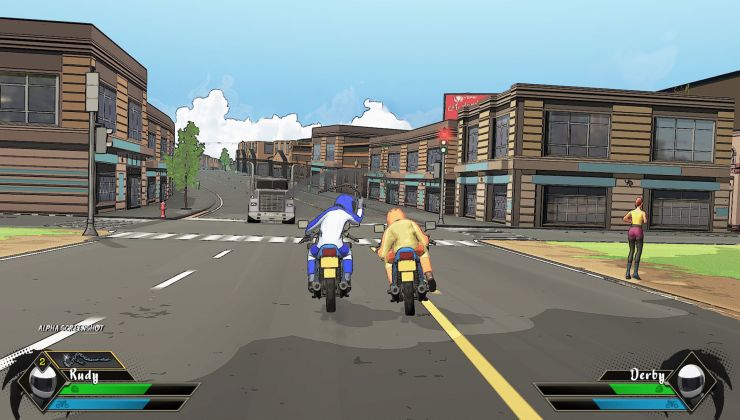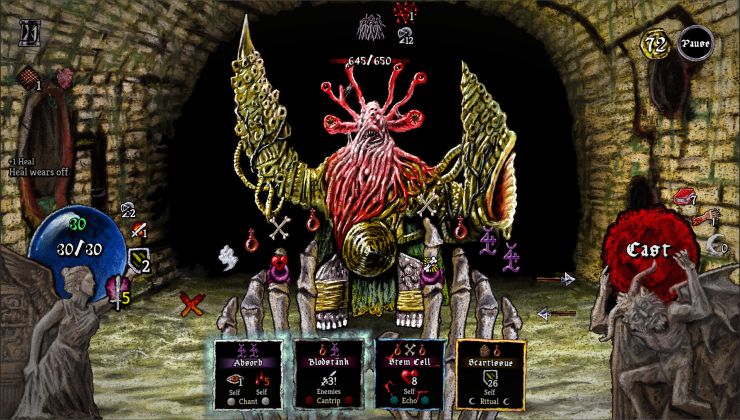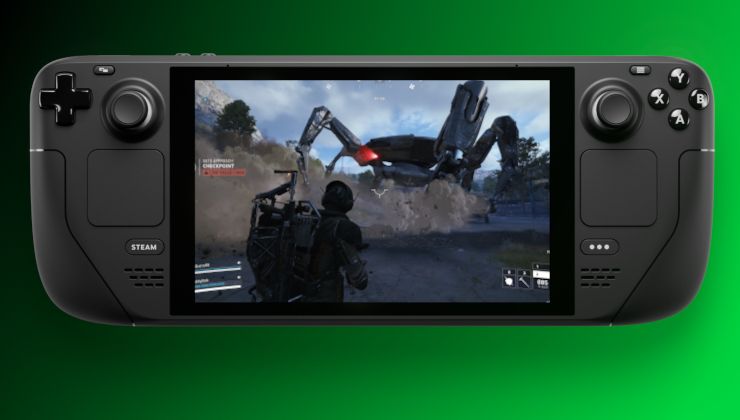Ethan Lee, the developer responsible for the XNA reimplementation FNA along with around 50 game ports to Linux and macOS has announced the sunsetting of future macOS ports with a big update to a bunch of existing games.
Don't know who Ethan Lee is? You've probably played plenty of games either directly ported by them or running on tech created / maintained by them including: Streets of Rage 4, Superliminal, FEZ, Transistor, Rogue Legacy, Salt and Sanctuary, Owlboy and loads more.
Writing on their IcculusFinger profile page, Lee wrote a few paragraphs about a little history before diving into the current state of Apple products mentioning "I've put it off for as long as I could, but after looking at Apple's trajectory vs. my own infrastructure for Mac support, it's looking like 2021 is the year that I have to say goodbye to the Mac as a primary target.".
The good news for Linux fans? According to Lee, "New games, however, will primarily be Linux (and Windows, if applicable) only.". It also seems quite interesting that console releases have been opening up the gates for Linux ports according to Lee too. This is also backwards to what we often see with Linux support removed (hi Rocket League), so it feels a little odd.
As for existing ports? Lee went ahead and updated over 30 currently live with the latest tech for both macOS and Linux, so you should see the games ported all continue running smoothly in future.
Hopefully Ethan Lee will have many more Linux ports planned for 2021 and beyond.
I also found the bit about drivers interesting, with how users and developers can grab a RenderDoc capture and post it to the Linux Mesa driver issue tracker when encountering a driver problem and sometimes get a response and a fix in the same day - shows how awesome open source can be, compared with Apple "reporting bugs to Apple when you're not rich is like pulling teeth with boxing gloves".
On top of all that? The latest releases of FNA, FNA3D and FAudio are out now.
Quoting: EikeI just wondered yesterday, reading about Apple's new ARM processor: What will Steam be doing?It will be interesting to watch what many companies will be doing... like Adobe for example...
Quoting: pbAs far as I understood, Adobe support is coming, albeit a bit late. Generally speaking Audio/Image and Video world will most likely continue supporting apple, unless they get trampled in the professional world. They have a lot of leverage there.Quoting: EikeI just wondered yesterday, reading about Apple's new ARM processor: What will Steam be doing?It will be interesting to watch what many companies will be doing... like Adobe for example...
For Steam, honestly, I never understood why even bother to port games to MacOS. Mac is already not such a big market, but the number of Macs that can actually game is probably multiple times smaller than Linux gaming market. Macbooks are KO, mac mini is KO, so it leaves you with a bunch of iMacs and Mac Pros users I guess ? I mean, what's the point ? Of course, now that vulkan support (through moltenVK) exists, and since it is posix, it might still make some sense to support both Linux and MacOS, but MacOS as a primary port platform makes no real sense to me.
Btw, if anything, with Valve not giving any effort on Proton/Steam play on Mac, I think we kinda have our answer: they won't shut down the remaining lights right away, but I think they have already disengaged mostly. As long as there are people buying games there, they will probably keep it alive, but I would not expect anything more.
Last edited by 3zekiel on 4 Jan 2021 at 1:18 pm UTC
You either go all-in with Apple, or you really have to carefully consider if it is worth it? Even though Apple still has a cult following in the developer community, I think they are hugely overestimating just how far are people willing to follow them.
In the end, if Apple doesn't care about gaming, why should game devs care about Apple?
Quoting: Ethan Lee... reporting bugs to Apple when you're not rich is like pulling teeth with boxing gloves.LOL! What a great simile!
I mean, I can understand flibit's position here, one person holding down the fort on their own is hard.
I'll even attempt to build Apple Silicon binaries and support that hardware as well if it seems like it's easy to do without first-hand testing (admittedly a bit lofty to attempt, but considering I'll probably have to support Aarch64 on Linux/Windows soon anyway it doesn't seem crazy).This is great, though. Supporting more architectures is always a noble goal.
It will also help find some bugs in the code that are hidden by x86 idiosyncrasies, including reordering constraints and memory alignment. Though probably not immediately on current Apple Silicon machines, since they're still able to run x86 binaries through Rosetta 2. I fully expect Apple to remove that feature in the near future, though, this is what they did with the first Rosetta too back then.
Quoting: DrMcCoyThat's sad. While I personally don't use macOS and sometimes macOS vs Linux is pushed into some kind of rivalry, I'm one of these "radical portability" types. I want more portability, not less.Having portable code is indeed quite cool, same for multi arch. But you also need to balance gain vs cost. Supporting windows + Linux + I think Switch for this case (I seem to remember he also works on Switch stuff) is already plenty enough.
I mean, I can understand flibit's position here, one person holding down the fort on their own is hard.
I'll even attempt to build Apple Silicon binaries and support that hardware as well if it seems like it's easy to do without first-hand testing (admittedly a bit lofty to attempt, but considering I'll probably have to support Aarch64 on Linux/Windows soon anyway it doesn't seem crazy).This is great, though. Supporting more architectures is always a noble goal.
It will also help find some bugs in the code that are hidden by x86 idiosyncrasies, including reordering constraints and memory alignment. Though probably not immediately on current Apple Silicon machines, since they're still able to run x86 binaries through Rosetta 2. I fully expect Apple to remove that feature in the near future, though, this is what they did with the first Rosetta too back then.
For MacOS, I do think it should be done if it does not cost much, but I think the issue is overall Apple is a burden. The part about bug report only for riches is a good example. It's always the same in the end, gain vs cost. Being multi plat will help stability up to a certain point, but it's a diminishing return. You find lot of nasty bugs by adding a platform, much less with the 3rd one, and then less and less. If you have console + windows + Linux, MacOS will not add much more. ARM porting maybe, but likely not much either. Alignment and co should be managed by the compiler unless you go quite low level, at which point your code is likely arch specific.
Quoting: 3zekielFor Steam, honestly, I never understood why even bother to port games to MacOS. Mac is already not such a big market, but the number of Macs that can actually game is probably multiple times smaller than Linux gaming market. Macbooks are KO, mac mini is KO, so it leaves you with a bunch of iMacs and Mac Pros users I guess ? I mean, what's the point ? Of course, now that vulkan support (through moltenVK) exists, and since it is posix, it might still make some sense to support both Linux and MacOS, but MacOS as a primary port platform makes no real sense to me.Seems Apple focuses on mobile-ish games. XCode is such a pain to code real c++ on, mostly made for swift and objective-c.
Also that's what Feral seems to lean into: iOS versions of Grid Autosport, XCom 2, Total Wars and so on.
(If AAA games gets adapted to run on iPhones/iPad I can definitely see them coming to arm desktops, but that's massive work.)
So no, macbooks and macminis are not KO, they just need slightly worse graphics and render pipeline sleeve tricks.
Quoting: chrisq"they"? Isn't ethan Lee a single person?Singular "they" is a very common and gender neutral way to refer to a person:
https://en.m.wikipedia.org/wiki/Singular_they
Quoting: fleskYup, and I'm British and I write using that way often because it's what's normal to me. I have, however, adjusted a few bits to hopefully make it even clearer.Quoting: chrisq"they"? Isn't ethan Lee a single person?Singular "they" is a very common and gender neutral way to refer to a person:
https://en.m.wikipedia.org/wiki/Singular_they
Quoting: aokamiSo no, macbooks and macminis are not KO, they just need slightly worse graphics and render pipeline sleeve tricks.Hmm true that they are not completely KO, but I mean, for many games you will have to give up a fair bit of quality to get them to run anywhere near a "pleasant" experience. Now of course, with a whole lot of optimisation and crazy tricks it's probably achievable, but worth it ... It is a bigger question. Macs represent around 2-3% of Steam gaming market, so in term of optimization cost vs return, computation will most likely not turn very positive. Apple Silicon does not get any more graphical power either according to few benchmarks I found. And as long as it is all integrated, it is unlikely to fight with gaming laptops, and even less with desktop obviously. Will have to see how the lineup evolves for iMacs in particular.
For the iOS/iPad part, it's true I did not think about that. But in the same way, it will require quite a few sacrifices. Honestly, at that point, better just bite the bullet and go cloud gaming. Porting older AAA why not, but newer ones will most likely look scary. Now, maybe you can something like DLSS using included NN cores though. But no idea if that's anywhere near powerful enough, Nvidia sure packs a lot of those for DLSS.
Maybe also if iPad and Apple Silicon macbooks share the same CPU/same OS, it will be more worth it, but how many tablet users are ready to pay AAA price for tablet gaming, considering the lack of good "gaming interface" (integrated joystick etc) is still a good question. iPad pros do have keyboard and mice, but at a very very prenium, really not mainstream price, and clearly not at a gaming competitive price I think (that's a multiple Switch or a good gaming laptop you can buy at this price point.)
Of course, time will tell, and might prove me wrong, but for now I would still not bet a lot on MacOS/iPad AAA gaming (eSport titles that run on a potato why not). And Valve actions show they don't seem to either - and Apple clearly did not make friends with Epic games situations, which certainly won't help.
There's one exception: some people do claim "it" for themselves, so when you know that about them, it's fine. Follows the common courtesy of using the name and pronoun people ask you to use for them.
Quoting: HoriWasn't "it" the neutral one?"It" is for things (and most animals, I guess), while "they" is for persons with either unknown gender or where it doesn't matter.
I've got a question too, though. Please take it as what it is - purely an interest in the language and its current usage ("they" for persons wasn't a thing when I learned English in school...). I'm not aware of any gender "unusualities" (trans, demi/diverse gender or whatever) of Ethan Lee and think they're male. If that's right, how "usual" is it to use singular they/them in such a case? What would be the wild guess of native speakers which percentage of people would use these words in such a case?
Quoting: EikeSeems to be a dialect thing, and rapidly changing at that. Up until recently I'd say it was quite uncommon in North America, but may have been more common fairly far in the past, and has recently fast become more common again.Quoting: HoriWasn't "it" the neutral one?"It" is for things (and most animals, I guess), while "they" is for persons with either unknown gender or where it doesn't matter.
I've got a question too, though. Please take it as what it is - purely an interest in the language and its current usage ("they" for persons wasn't a thing when I learned English in school...). I'm not aware of any gender "unusualities" (trans, demi/diverse gender or whatever) of Ethan Lee and think they're male. If that's right, how "usual" is it to use singular they/them in such a case? What would be the wild guess of native speakers which percentage of people would use these words in such a case?
Liam seems to be saying it's more common in British English; Liam's British and I'm not, and I have no reason to disbelieve it.
Quoting: Purple Library GuyOn the fun side, in French we use something similar for gender neutrality with "ils/eux" which is equivalent to they/them. But now there are some discussions since originally, it is the masculine version of the pronoun. Long time ago it seems we would use the masculine or feminine depending to either who was speaking or the gender of the first noun in a compound subject.Quoting: EikeSeems to be a dialect thing, and rapidly changing at that. Up until recently I'd say it was quite uncommon in North America, but may have been more common fairly far in the past, and has recently fast become more common again.Quoting: HoriWasn't "it" the neutral one?"It" is for things (and most animals, I guess), while "they" is for persons with either unknown gender or where it doesn't matter.
I've got a question too, though. Please take it as what it is - purely an interest in the language and its current usage ("they" for persons wasn't a thing when I learned English in school...). I'm not aware of any gender "unusualities" (trans, demi/diverse gender or whatever) of Ethan Lee and think they're male. If that's right, how "usual" is it to use singular they/them in such a case? What would be the wild guess of native speakers which percentage of people would use these words in such a case?
Liam seems to be saying it's more common in British English; Liam's British and I'm not, and I have no reason to disbelieve it.
Now we have multiple new usages being discussed either write stuff like il(s)/elle(s), and put all possible suffixes at the end of each nouns. Or (in my opinion) prettier ones like "iel" which would be the gender neutral noun and actually sounds "good" as French.
It is interesting how languages evolve, and seemingly in similar directions. Maybe the discussion of not invisibilizing women (which led to these discussions in French) will also make English change further after. Wait and See I guess.
As for my two cents, I did ear a lot my colleagues (Canadian/UK) use the they/them as gender neutral too, so I thought it was pretty standard.
Last edited by 3zekiel on 5 Jan 2021 at 6:34 pm UTC












 4 Jan 2021
4 Jan 2021
 How to setup OpenMW for modern Morrowind on Linux / SteamOS and Steam Deck
How to setup OpenMW for modern Morrowind on Linux / SteamOS and Steam Deck How to install Hollow Knight: Silksong mods on Linux, SteamOS and Steam Deck
How to install Hollow Knight: Silksong mods on Linux, SteamOS and Steam Deck